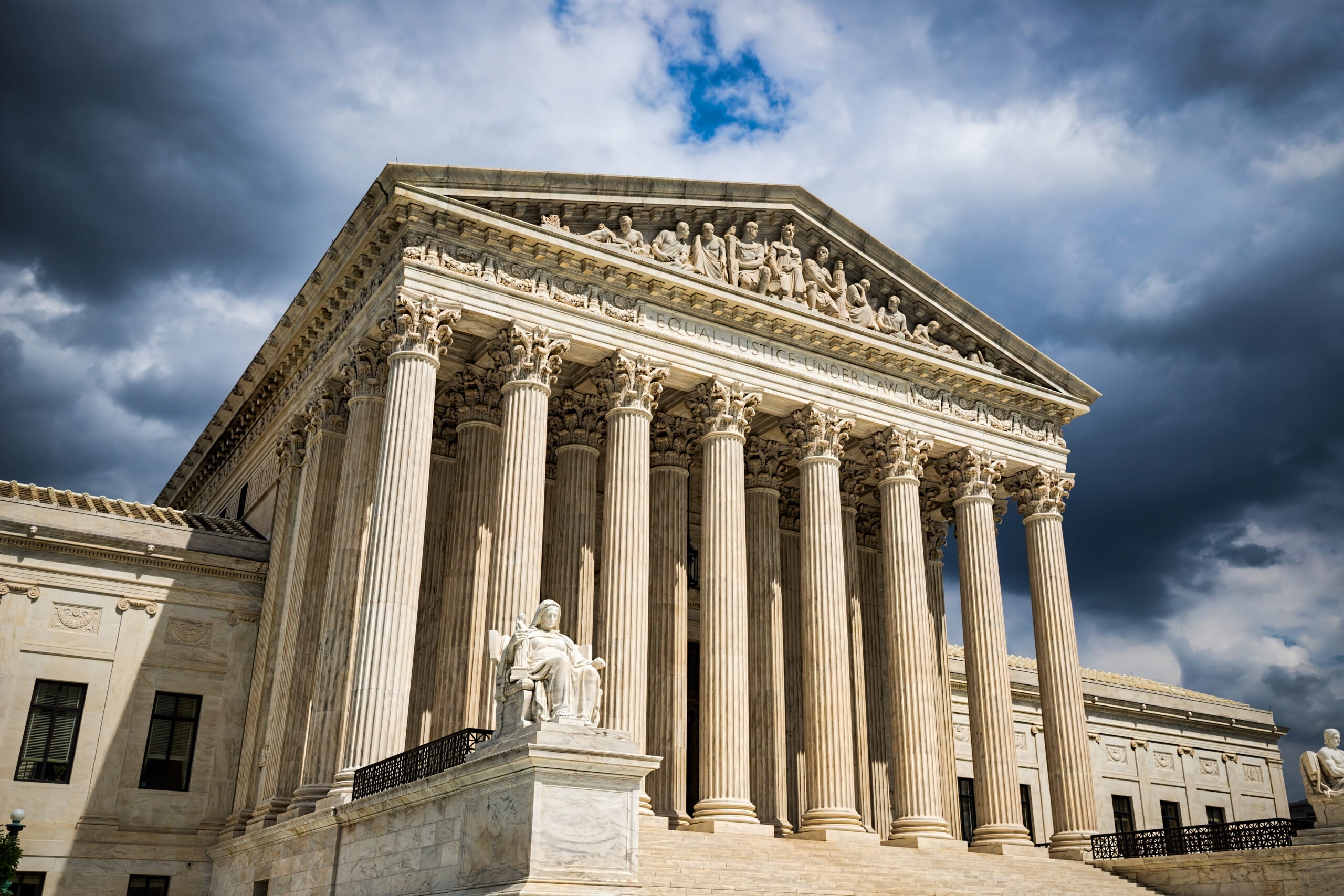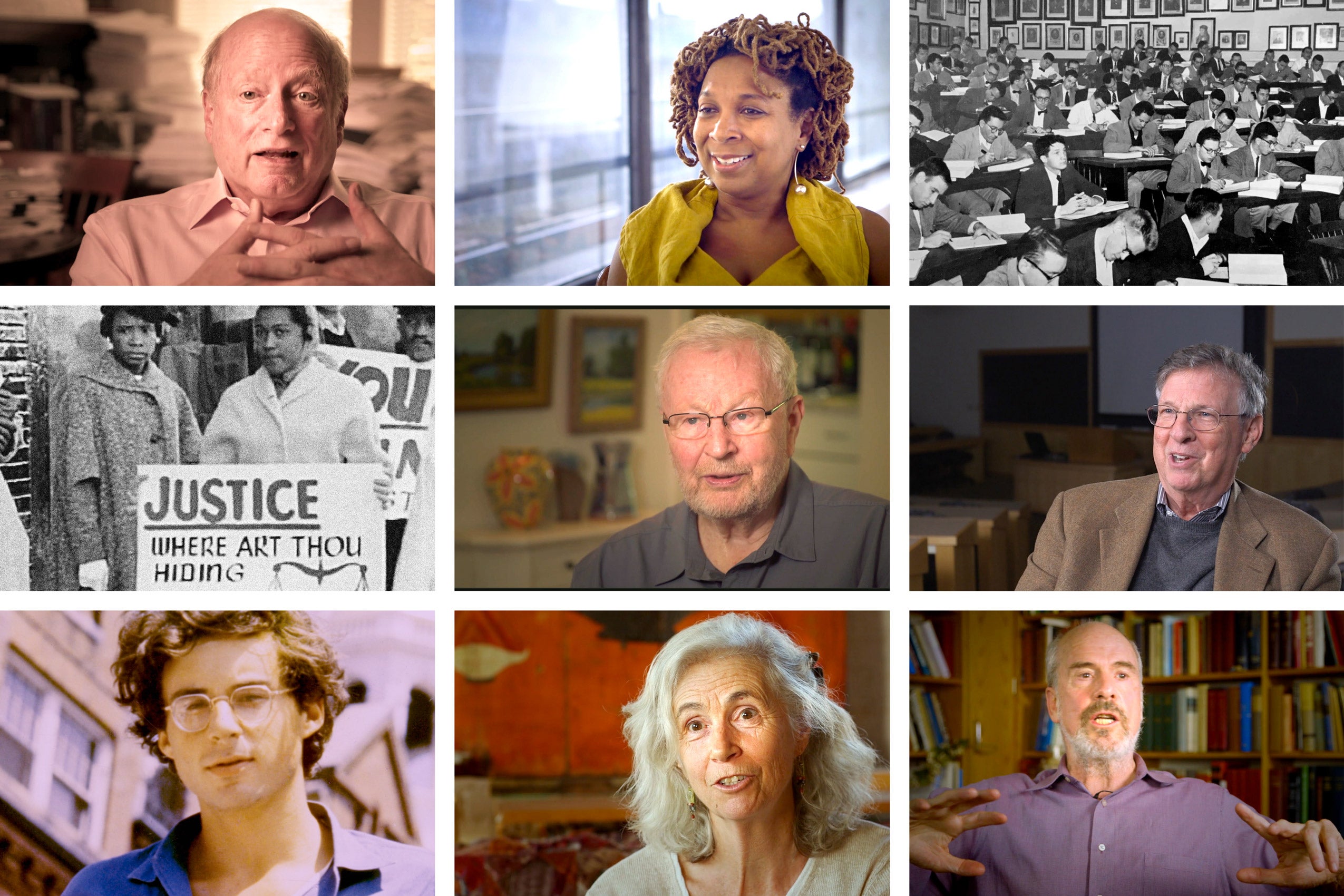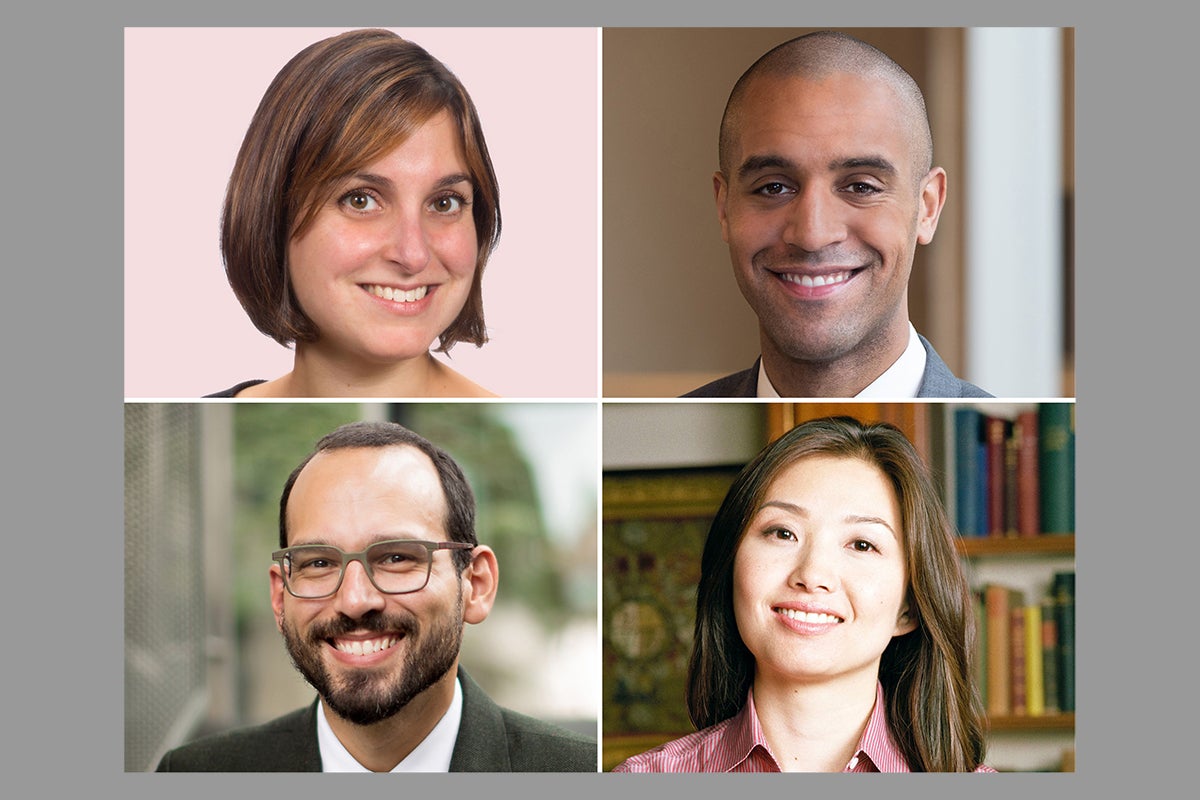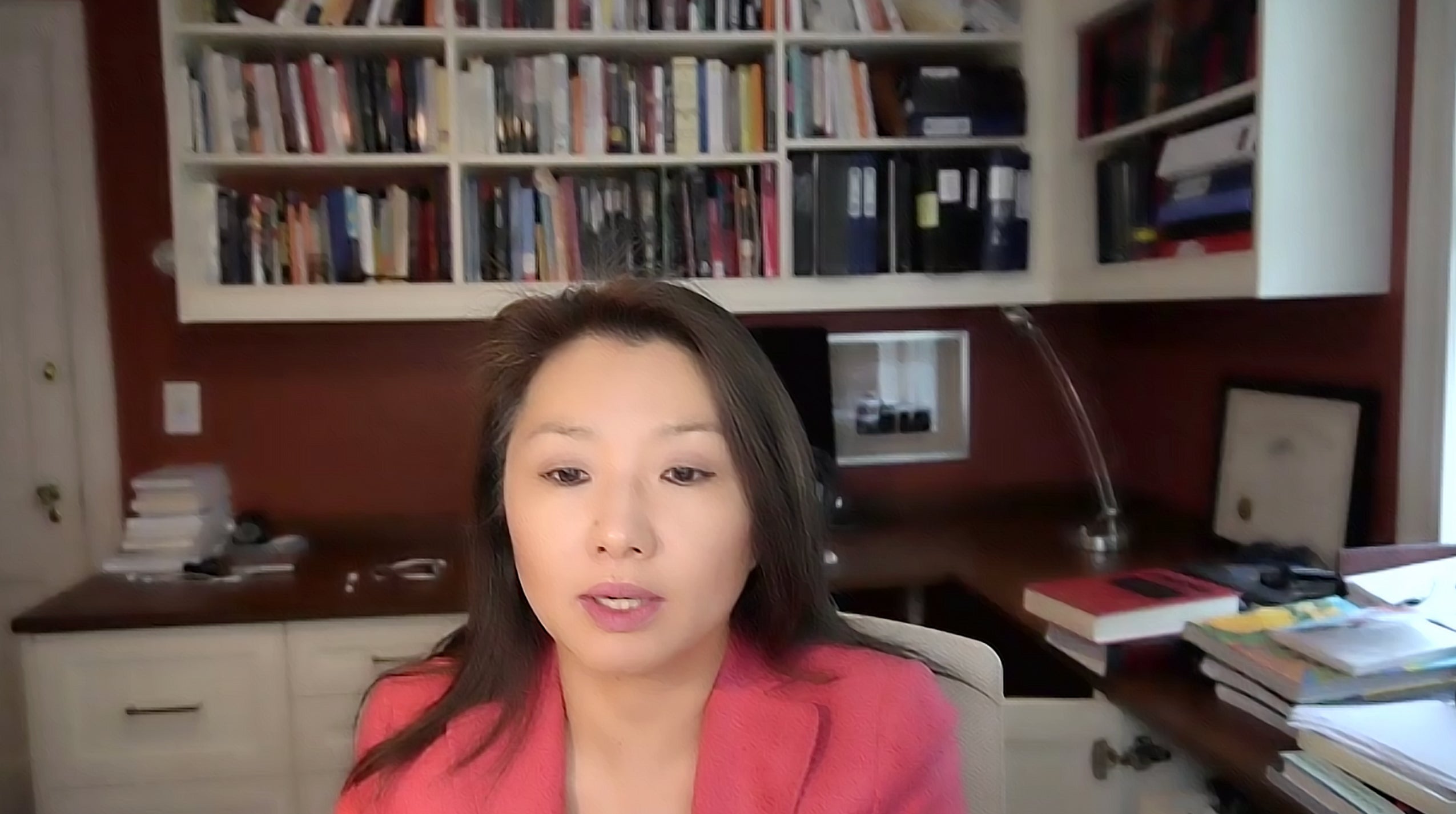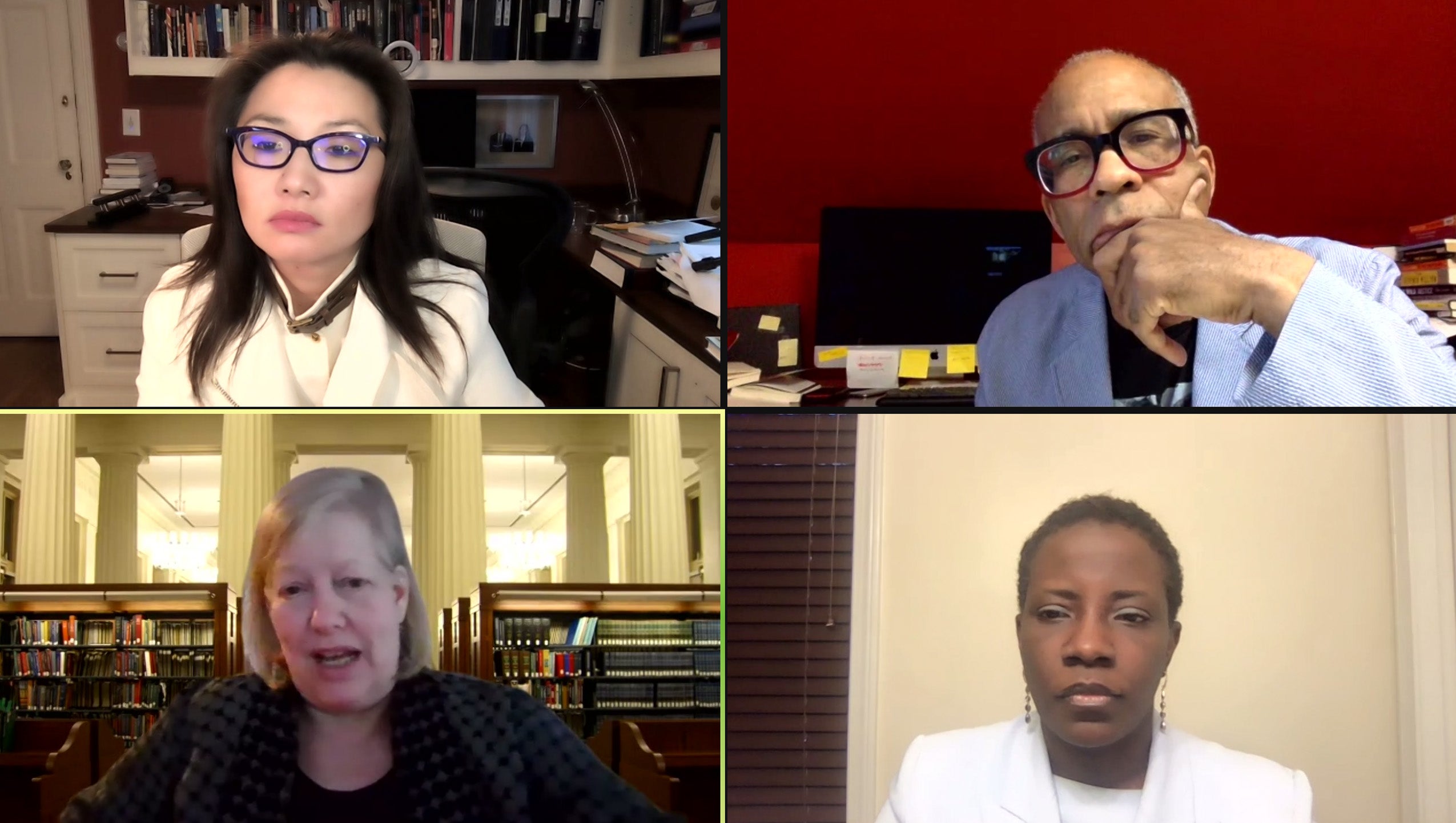People
Jeannie Suk Gersen
-
Debating the future of Roe
December 3, 2021
At the recent Rappaport Forum, panelists discussed abortion rights and whether the Supreme Court should honor precedent — or jettison Roe v. Wade.
-
Vice President Kamala Harris cast the tie-breaking vote in October to confirm Catherine Lhamon to lead the Department of Education's Office for Civil Rights (OCR). When Lhamon held the same position under the Obama administration, her office enforced Title IX—the federal statute prohibiting sex-based discrimination in education—in a manner that endangered fundamental free speech and due process rights. ... Last year, the Department of Education enacted new, balanced regulations that protect the rights of all students, consistent with many judicial rulings. ... Prominent feminist legal scholars, including Harvard Law professors Jeannie Suk Gersen and Janet Halley, as well as the University of San Francisco Law School's Lara Bazelon, heralded the regulations for their overall fairness and for rectifying injustices in OCR's prior policies.
-
If Roe v. Wade Goes, What Next?
November 22, 2021
Podcast featuring Jeannie Suk Gersen, John H. Watson, Jr. Professor of Law: Will the Supreme Court Overturn Roe v. Wade? Critical cases on abortion rights are being heard by a 6–3 majority of conservative Justices. The decisions will have repercussions for everyone of childbearing age.
-
Detroit residents voting on whether to decriminalize ‘magic mushrooms’ and other psychedelic drugs
November 3, 2021
Detroit could be the latest big city to decriminalize "magic mushrooms" and other psychedelics drugs as residents take to the polls Tuesday. Voters will be asked under proposal E: "Shall the voters of the City of Detroit adopt an ordinance to the 2019 Detroit City Code that would decriminalize to the fullest extent permitted under Michigan law the personal possession and therapeutic use of Entheogenic Plants by adults and make the personal possession and therapeutic use of Entheogenic Plants by adults the city's lowest law-enforcement priority?" ... Harvard Law School launched the Project on Psychedelics Law and Regulation this summer to examine the legal framework around psychedelic research. "Preliminary research suggests that psychedelics could hold major benefits for people experiencing trauma and post-traumatic stress disorder," Harvard Law professor Jeannie Suk Gersen said in a statement. "By analyzing social, legal, and political barriers to access in this context, we hope to advance the understanding of their potential impact as therapeutics."
-
After Full Circuit’s Recusal and Lawyers’ Request, Panel of Judges Hearing Case Is Revealed
November 2, 2021
The panel of judges hearing a lawsuit from which all the judges on a circuit have recused themselves was revealed Monday, after the lawyers behind the case requested to know which judges would preside over the appeal. The full U.S. Court of Appeals for the Fourth Circuit is recused from the lawsuit filed by “Jane Roe,” a former federal public defender who is alleging harassment while in her job and mounting a challenge to the way the federal judiciary handles misconduct complaints. The complaint names the circuit, as well as its chief judge and judicial council. Federal public defenders fall under the scope of the federal judiciary. ... The Fourth Circuit typically does not reveal the panel of judges hearing a case until the morning of arguments. Cooper Strickland and Harvard Law professor Jeannie Suk Gersen, who are representing Roe in the case, on Oct. 29 filed a motion to publicly post the judges presiding in the case, noting that orders had been issued but it was unclear who was behind those orders.
-
An Entire Circuit Is Recused From a Case. These Lawyers Want to Know Which Judges Are Handling It Instead
November 1, 2021
The attorneys behind a former federal public defender’s lawsuit challenging the judiciary’s approach to handling misconduct claims want to find out which judges are considering the case’s appeal, after the entire circuit recused itself from the case. The Jane Roe lawsuit is currently before the U.S. Court of Appeals for the Fourth Circuit. The full circuit recused itself soon after the appeal was filed, presumably because the complaint names the circuit, its chief judge and judicial council. Lawyer Cooper Strickland and Jeannie Suk Gersen, a professor at Harvard Law School, on Friday filed a motion requesting that orders “resulting from this intercircuit-assignment process” be filed on the public docket for the case. “This public disclosure is required by statute, as well as constitutional principles of fairness and transparency in judicial proceedings,” the filing reads. The opposing parties in the case, represented by the Justice Department, have no position on the motion, according to the filing.
-
Marriage takes a lot of work. And part of preventing eventual heartache, says law professor Jeannie Suk Gersen, is seeing marriage and partnership through the lens of divorce. Jeannie Suk Gersen is the John H. Watson, Jr. Professor of Law at Harvard Law School, where she has taught courses on constitutional law, criminal law and procedure, family law, and sexual assault and harassment.
-
What If Trigger Warnings Don’t Work?
September 29, 2021
An article by Jeannie Suk Gersen: Earlier this year, Brandeis University’s Prevention, Advocacy, and Resource Center released a “Suggested Language List,” developed by “students who have been impacted by violence and students who have sought out advanced training for intervening in potentially violent situations.” The students’ purpose, they wrote, was “to remove language that may hurt those who have experienced violence from our everyday use.” They proposed avoiding the idioms “killing it,” “take a stab at,” and “beating a dead horse.” I was struck that one of the phrases they recommended avoiding was “trigger warning,” and that the proffered explanation was sensible: “ ‘warning’ can signify that something is imminent or guaranteed to happen, which may cause additional stress about the content to be covered. We can also never guarantee that someone will not be triggered during a conversation or training; people’s triggers vary widely.”
-
Fed. Court Workers Watching ‘Emblematic’ Harassment Case
September 23, 2021
A novel lawsuit challenging the federal judiciary's handling of sexual harassment is "emblematic" of all that is wrong with the courts as a workplace, say advocates, who warn that a ruling favoring the judiciary could leave its employees with few options to combat misconduct. ... That lack of statutory protections is one of the reasons why Roe's suit claims the judiciary's failure to address her harassment complaints violated the due process and equal protection clauses of the Fifth Amendment, according to professor Jeannie Suk Gersen of Harvard Law School, who is serving as lead counsel on Roe's appeal. “Roe cannot bring a claim under Title VII, or any other federal employment statute, because it does not cover the 30,000 federal judiciary employees,” Gersen said. “That would be an unacceptable gap in legal protection against employment discrimination, if the Constitution did not protect those employees from discrimination.”
-
Sounds Legit
September 20, 2021
Leah is joined by Jeannie Suk Gersen and Deeva Shah to discuss an important case, Roe v. United States, about the procedures for addressing workplace misconduct in the federal courts.
-
The Manifold Threats of the Texas Abortion Law
September 7, 2021
A column by Jeannie Suk Gersen: In “The Origins of Totalitarianism,” Hannah Arendt observed the early tendency of a totalitarian regime to draft private citizens to conduct “voluntary espionage,” so that “a neighbor gradually becomes a more dangerous enemy than officially appointed police agents.” Echoes of this fear could be felt in the dissents from the Supreme Court’s decision on Wednesday not to block enforcement of a Texas law that prohibits abortion after roughly the sixth week of pregnancy. The statute, enacted in May, authorizes citizens to file a lawsuit against a party that performs or even unintentionally “aids or abets” such an abortion, and to exact damages of at least ten thousand dollars for each forbidden abortion from that defendant if they win the case. As Justice Sonia Sotomayor put it in her dissenting opinion, “The Texas Legislature has deputized the State’s citizens as bounty hunters, offering them cash prizes for civilly prosecuting their neighbors’ medical procedures.” Chief Justice John Roberts and Justices Stephen Breyer and Elena Kagan also dissented; each penned dissenting opinions emphasizing the novel structure of the legislation, which delegates enforcement to members of the general populace.
-
Comments on body parts. Questions about pregnancy. Court filing alleges ongoing harassment in judiciary.
September 1, 2021
... In support of a lawsuit filed by a former public defender in North Carolina, more than 20 current and former law clerks and employees of federally funded public defender’s offices and the Administrative Office of the U.S. Courts in Washington offered firsthand accounts of a system that they say still lacks protections and procedures to hold officials accountable. ... On appeal at the 4th Circuit, Roe is represented by Harvard Law School professor Jeannie Suk Gersen and has the backing of more than 40 public-interest and civil rights organizations, in addition to constitutional scholars. Gersen said in a court filing last week that the judiciary’s internal complaint system was rife with conflicts of interest and failed to provide meaningful review or to stop the harassment. The system “facilitated and aggravated the hostile work environment, which became so intolerable that Roe was forced to resign and lose her career as a federal public defender.”
-
The new puritans
August 31, 2021
... Right here in America, right now, it is possible to meet people who have lost everything—jobs, money, friends, colleagues—after violating no laws, and sometimes no workplace rules either. Instead, they have broken (or are accused of having broken) social codes having to do with race, sex, personal behavior, or even acceptable humor, which may not have existed five years ago or maybe five months ago. ...Conversations between people who have different statuses—employer-employee, professor-student—can now focus only on professional matters, or strictly neutral topics. Anything sexual, even in an academic context—for example, a conversation about the laws of rape—is now risky. The Harvard Law School professor Jeannie Suk Gersen has written that her students “seem more anxious about classroom discussion, and about approaching the law of sexual violence in particular, than they have ever been in my eight years as a law professor.”
-
The Influence of Critical Legal Studies
August 11, 2021
By the time Jeannie Suk Gersen ’02 was a first-year law student at HLS, the Critical Legal Studies movement had been pronounced dead. And yet “every corner you turned and every closet you opened at the law school, there it would be, in some sort of zombie or ghost-like form,” she recalls.
-
Petrie-Flom Center announces new research initiative on psychedelics law and regulation
July 7, 2021
The Petrie-Flom Center at Harvard Law School has announced a new research initiative, the Project on Psychedelics Law and Regulation, to promote safety, innovation, and equity in psychedelics research, commerce, and therapeutics.
-
Broadway Tickets, Anthony Bourdain’s Final Book, Snapchat & Free Speech, Nicole Chung’s Memoir
May 12, 2021
Helen Shaw, theater critic at New York Magazine, joins us to discuss the return of Broadway ticket sales in anticipation of September’s reopening. WNYC planning editor Kate Hinds joins us to discuss the stories that the newsroom is covering this week. Laurie Woolever joins us to discuss World Travel: An Irreverent Guide, the final book Anthony Bourdain worked on, completed almost entirely after his death in 2018. Woolever, who was Bourdain's assistant and friend, served as co-author for this entertaining and practical guide to travelling to, eating at, and staying in some of Bourdain’s favorite places. The Supreme Court recently heard oral arguments in a case that could determine public school's abilities to police student's speech off campus. The case began when a young woman named Brandi Levy sent out an curse-laden Snapchat expressing her frustration at not making the Varsity cheerleading squad, and was suspended from the JV team. Jeannie Suk Gersen, John H. Watson, Jr., Professor of Law at Harvard Law School and New Yorker contributing writer, joins us to discuss the case, known as Mahanoy Area School District v. B.L.
-
An essay by Jeannie Suk Gersen: The story of Mahanoy Area School District v. B.L. began when Brandi Levy, a high-school freshman in eastern Pennsylvania, was passed over for the varsity cheerleading team. Levy took to Snapchat to express frustration...According to a coach, some students who saw the posts were “visibly upset” and found them “inappropriate.” Levy was suspended from cheerleading for a year for violating the team’s rules, which require that students “have respect” for the school, coaches, and teammates, avoid “foul language and inappropriate gestures,” and refrain from sharing “negative information regarding cheerleading, cheerleaders, or coaches...on the internet.” The coaches as well as the school district also maintained that she violated a school rule that athletes must conduct themselves during the season “in such a way that the image of the Mahanoy School District would not be tarnished in any manner.” Levy, represented by the American Civil Liberties Union, filed a lawsuit, alleging that her suspension from the team violated the First Amendment. Last week, the Supreme Court heard oral arguments in the case, which the Justices understood not only to raise the question of whether public schools may discipline students for speech outside of the school-supervised setting but also to implicate public schools’ power to punish students for discrimination, harassment, and bullying.
-
Harvard Law School’s 2021 Last Lecture Series
May 5, 2021
The Last Lecture Series at Harvard Law School, sponsored annually by the 3L and LL.M. class marshals, is an HLS tradition in which selected faculty members impart insight, advice, and final words of wisdom to the graduating class.
-
Professor Jeannie Suk Gersen ’02 introduced this year’s inaugural Last Lecture by reminding the graduating class of its special place in history.
-
Harvard Law professors discuss the Derek Chauvin trial, its implications, and potential paths forward
April 22, 2021
A panel of Harvard Law professors discussed the guilty verdict in the Derek Chauvin trial, which proved an occasion for cautious optimism, a bit of anxiety, and questions about what comes next.
-
The Vital Role of Bystanders in Convicting Derek Chauvin
April 21, 2021
An essay by Jeannie Suk Gersen: The jury trial as we know it evolved from a medieval English practice in which jurors were people in the neighborhood who were already familiar with the parties or the events at issue. They were chosen precisely because they represented the local community’s knowledge of the case. Today, a “jury of one’s peers” consists of fellow-citizens whom we instead ask, ideally, to serve as blank slates: they are chosen for their lack of connection to the events and the ability to put prior views and influences aside in examining the evidence that is presented, and sometimes even dramatized, at trial. On Tuesday, after ten hours of deliberation over the course of two days, a Minneapolis jury found the former police officer Derek Chauvin guilty of two counts of murder and one count of manslaughter, for killing George Floyd, last May. In many ways, it was a conventional trial, in which eyewitnesses testified and experts weighed in on the disputed facts. Yet it called to mind a bygone mode in which the jury’s role was grounded in the act of witnessing.
